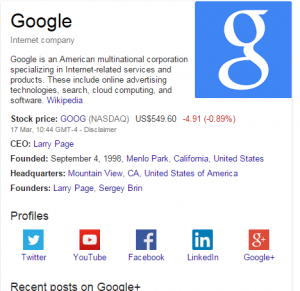The ever-changing platform of Google can seem to make it an unfair playground for businesses, right?
No. You’d be wrong. In fact the whole point is to make it an even playing field for all, ensuring both websites and users get a rich enhanced and accurate search experience. So many people consider Google algorithm updates as one big event when in fact it is continuously evolving in different areas, some changes will affect search in a big way then others in a minor way.
Some of the most common names you may have heard of are:
- Hummingbird – Read all about it here
- Panda – The change aimed to lower the rank of “low-quality sites” or “thin sites”, and return higher-quality sites near the top of the search results – Read more
- Penguin – Introduced in 2012 to prevent bad back linking to websites
- Pigeon – Introduced in 2014 to provide more accurate local search results
The Gods of Google are working on all these updates all the time. Simultaneously, to provide updates and give us a better search experience. If you really want to see the extent of the updates check out the MOZ Algorithm calendar.
We digress, so let’s step aside of that for the moment.
Let’s think a little a bit about what Google is trying to achieve. It wants to give the user the best possible organic result and USER EXPERIENCE that it can provide. It’s so much deeper than just achieving high rankings in Google. Google knows this. Once we hit a page so many factors can keep us on the page or put us off, this landing page experience is now being considered in how well a page can perform:
1) In Google
and
2) How well it performs for your business. Meaning converting a user, engages a user, uses CTAs, stays on the page. Even down to if your content is factual.
Many years ago I wrote a paper on the Semantic Web and how this will be the future of how the web will be. Finally it seems that this is becoming the case. Google is not only understanding websites as entities but also how well they are being used. Or not used in some cases. It is now even more crucial for your website to be built in the right way. Not only using great UI design, then considering UX testing to always improve. Using clever analytics to continuously improve the experience for each user to the point they want to shout
“Hey check this site out it’s the…”.
The way the code is being marked up behind the sciences is forever evolving. Google wants to know more and more on what the website is actually about. The content within means nothing unless you tell Google.
One of my favourites at the moment is the Google Social Markup code, it has opened lots of debates why do they do it, whats it for etc.
Pleasing the Google Gods
It’s simple. Google wants to provide you with an overall view of a brand or entity, not ignore it. Although I do sit on the side of the fence that Google must be actively monitoring social signals for lots of reasons. If you’re not doing it, then why not?! We all know social media has lots of other benefits.
If you are an avid follower of the Google Webmaster Blog as we are, you’ll know. You will know that by the 21st April Google will be expanding their use of mobile-friendliness as a ranking signal. Yet another usability experience issue that needs to be considered, read more here.
Throughout this post I’ve hardly mentioned content, link building or even keywords. Now I’m not saying these are no longer important, they all form part of a bigger picture. One that helps Google learn the Semantics of your site or business entity and what it may be linked too. I’ll avoid going into ontologies at this point maybe another day. If you want to read a couple of great articles on the state of link building or how important content is read the following:
So just take a minute. Stop and think about your site, how it works, how people use it. Would you display it in Google and would you end up using it? If not, start planning for the future and as I tell our clients – EMBRACE MOBILE TECHNOLOGY quick!






